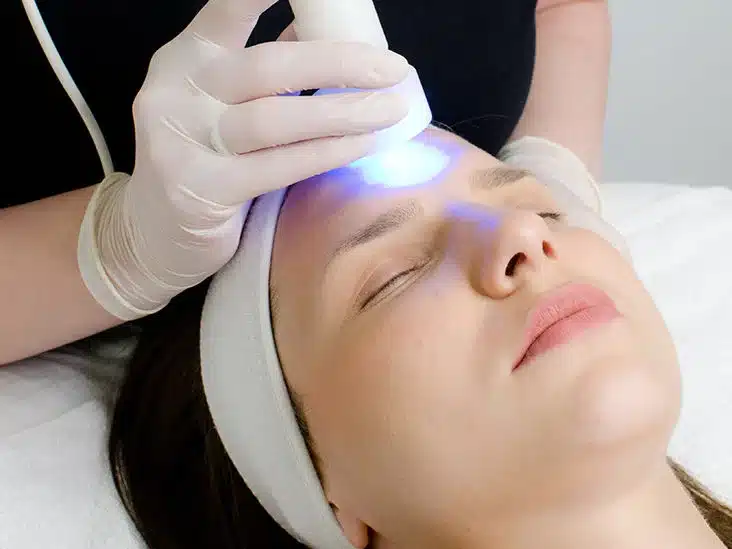LED light therapy is a popular and safe way to treat your skin. Unlike some other treatments, it doesn’t use harmful UV rays, which can have side effects. But it’s crucial to use it correctly to stay safe and avoid problems.
In this article, we’ll look at how to use LED light therapy safely and what possible side effects to watch out for. We’ll get advice from a dermatologist to help you understand it better.
Table of Contents
Is LED light therapy safe?
Yes, LED light therapy is safe for your skin. It’s a proven method for treating various skin issues. Unlike sunlight, LED therapy doesn’t have harmful UV rays. Let’s look at why it’s safe.
One big plus is that LED therapy doesn’t give off UV rays. UV rays can cause sunburn, skin damage, and even lead to aging and skin cancer. So, LED therapy is much safer than natural sunlight and some other light treatments.
LED therapy uses controlled levels of light that your skin can handle without problems. It won’t burn your skin like treatments such as chemical peels or lasers. The light it uses is in a safe range and won’t hurt the surface of your skin.

Is LED Light Therapy Safe During Pregnancy?
If you’re pregnant, it’s crucial to talk to your doctor before trying light therapy.
Is LED Light Therapy Safe for Dark Skin?
Yes, LED light therapy is safe for all skin types, including dark skin. It’s gentle and won’t cause burns like some other treatments.
Is LED Light Therapy Safe for Rosacea?
LED light therapy devices are not officially approved for treating rosacea, but many people with this condition have found them helpful and safe for improving their skin.
Learn more: Best LED Light Therapy Masks
What Are the Side Effects of LED Light Therapy?
LED light therapy is generally safe and painless, especially when using an LED device at home. However, if you choose to get professional treatment at a dermatologist’s office, there are some rare side effects to be aware of.
Professional LED light therapy typically starts with applying a photosensitizer, a topical medication that makes the skin more sensitive for the treatment. During the procedure, a few people might feel discomfort or mild pain in the treated areas of their skin. Afterward, some individuals might experience photosensitivity reactions, which can result in these side effects:
- Redness
- A stinging or burning sensation
- Skin peeling
- Temporary acne flare-ups
- Temporary darkening of the skin (hyperpigmentation)
- Hives or eczema
It’s important to know that these side effects are often linked to the cream applied before the treatment, and they tend to be uncomfortable but temporary. They usually go away within a few days and should completely disappear within three weeks.
To avoid these potential side effects altogether, many people prefer using LED devices at home instead of going for professional dermatologist treatments. At-home therapies can offer the same benefits as professional LED light therapy without the associated risks. I personally use the Cleopatra LED Mask and have not experienced any side effects.
Who Should Not Use Light Therapy?
While most people can benefit from LED light therapy without any issues, some individuals may experience more severe side effects. Here’s who should avoid light therapy:
-
If you’re currently using Accutane to treat your acne, it’s not recommended to combine it with light therapy.
-
If you’re using a skincare product that makes your skin more sensitive to sunlight, it’s best to stay away from light therapy.
-
If you’re taking medication that makes you more sensitive to light, it’s advisable to avoid light therapy.
-
If you have an active rash on your skin, it’s best to wait until the rash has healed before trying light therapy.
-
If you have a history of skin cancer or eye diseases, it’s important to consult with a healthcare professional before undergoing light therapy.
-
If you have a history of reactions to light (photosensitivity), it’s wise to be cautious with light therapy.
While a few individuals should avoid light therapy for these reasons, it’s important to know that LED light treatment is generally safe for the vast majority of people.
Precautions
Here are some important things to keep in mind before trying LED light therapy:
-
Accutane Users: If you’re currently using Accutane for acne, it’s best to avoid LED light therapy as it may not work well with the medication.
-
Skin Rashes: Wait until your skin rashes have completely cleared up before using LED light therapy.
-
Consult a Professional: Always talk to a dermatologist or healthcare expert before trying LED light therapy to make sure it’s safe and suitable for your specific needs.
While side effects of LED light therapy are rare, they can include temporary issues like inflammation, redness, or rashes. These are usually mild and go away on their own without causing long-term problems.
Remember, protecting your eyes is crucial during LED light therapy. Direct exposure to the LED light can harm your eyes, potentially affecting the retina. To be safe, use proper eye protection such as goggles or shields as recommended by your practitioner or the device instructions.
Conclusion
In conclusion, LED light therapy is a safe and effective way to improve your skin when used correctly. It’s a natural treatment that doesn’t involve harmful UV rays, which is why it’s so popular.
To make sure you stay safe and get the best results, it’s crucial to use LED light therapy properly and follow the right methods. Using it the wrong way or too much can be risky, so it’s essential to be well-informed.
For a safe and successful experience, it’s highly recommended to talk to a dermatologist or skincare expert before adding LED light therapy devices to your skincare routine at home. Their advice will help you use this therapy effectively and avoid any potential issues.